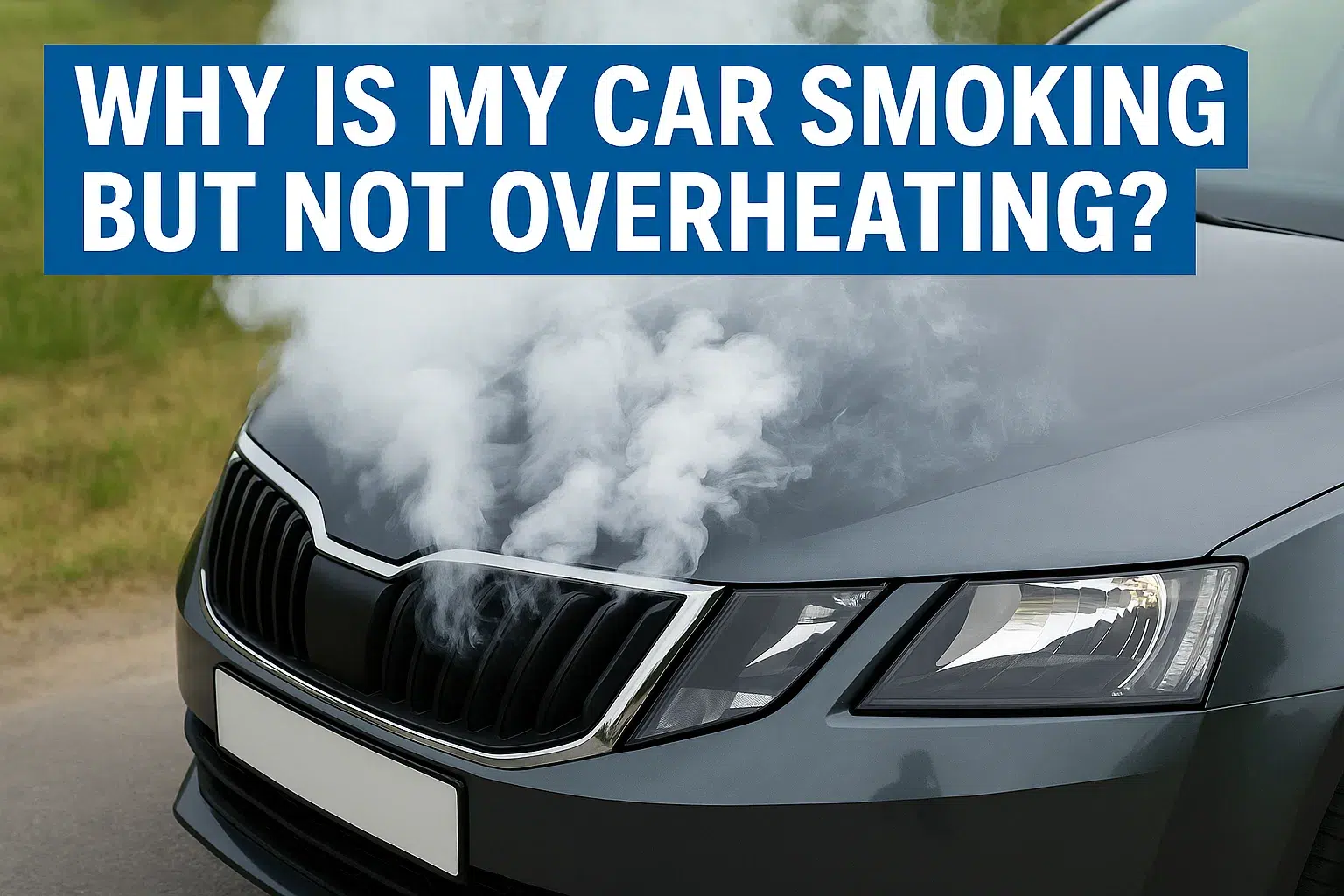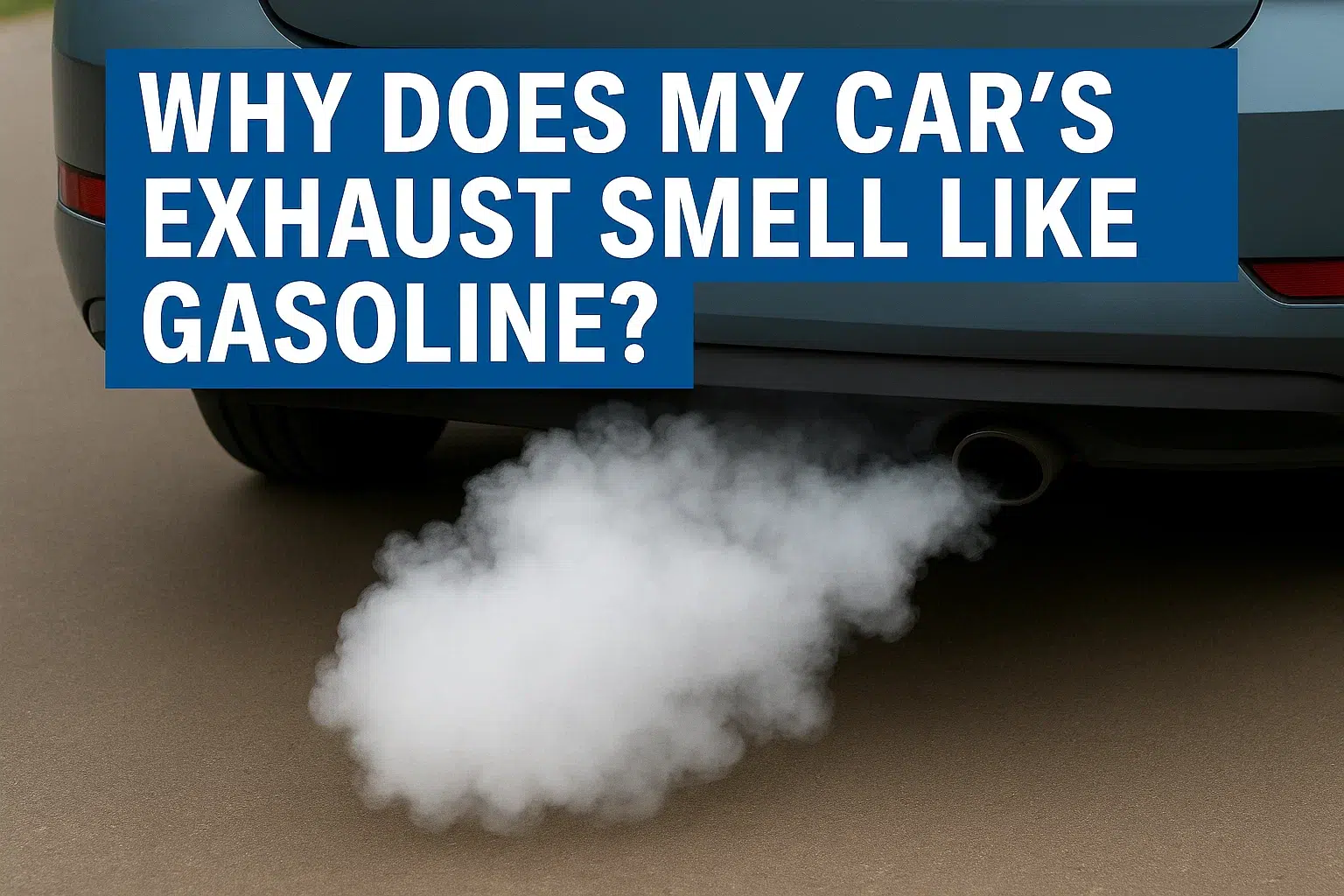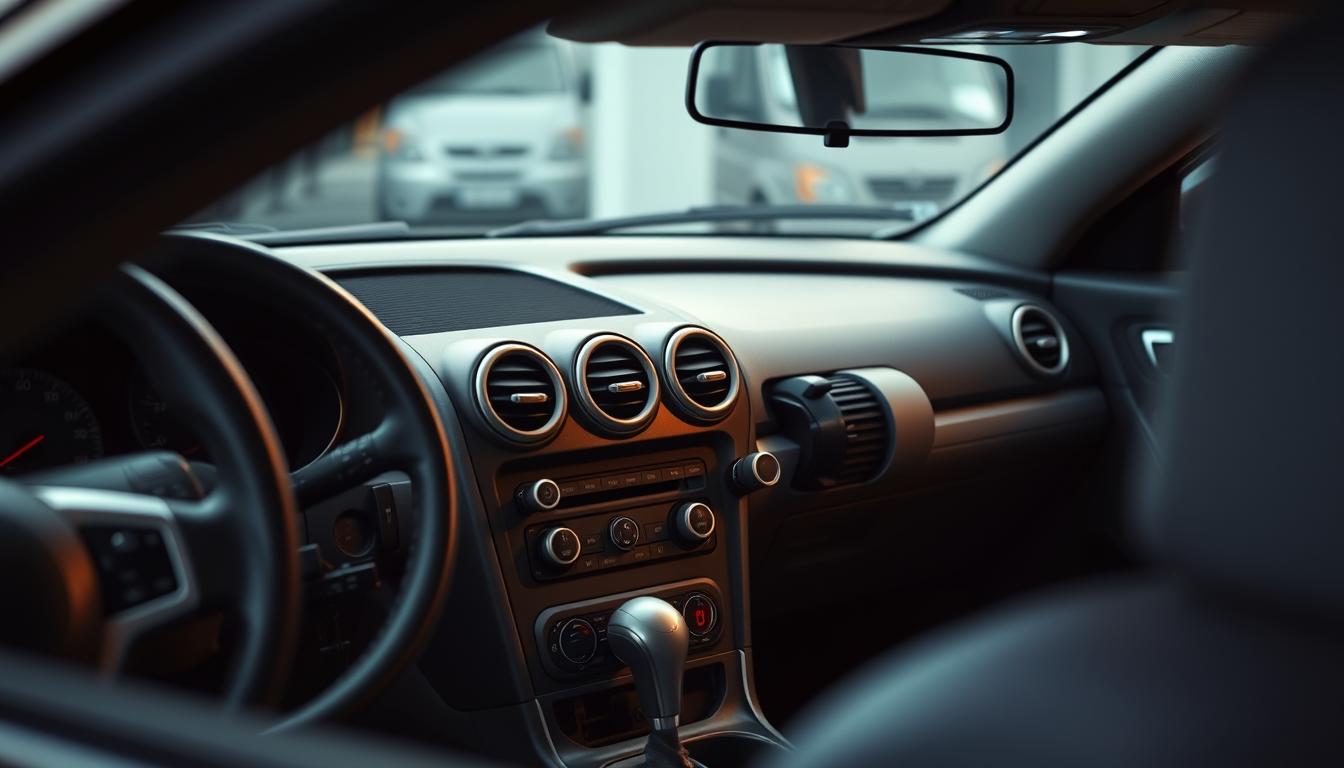Your car might be leaking oil after an oil change due to a loose oil filter, improper oil drain plug installation, or overfilled oil.
Did you notice oil under your car after an oil change? It’s scary if you don’t know why. Oil leaks after an oil change are more common than you think. Knowing why helps keep your car running well.
An oil leak can harm your engine and cost a lot to fix if not fixed soon. Finding out why and fixing it fast is key. We’ll look at why oil leaks happen after an oil change and how to stop or fix them.
Understanding Post-Oil Change Leaks
It’s common for cars to leak oil after an oil change. Knowing why this happens is important. Oil leaks can be small or big, and finding the cause is key to keeping your car running well.
Normal Seepage vs. Problematic Leaks
Not every oil leak is a big deal. Some cars might leak a bit around the oil filter or drain plug, which is normal. But, big or ongoing leaks mean you need to take action.
Small leaks might not cause big problems, but it’s good to keep an eye on them. Big leaks, though, can harm your engine, make your car run poorly, and cost a lot to fix if ignored.
How Oil Change Procedures Can Lead to Leakage
Oil changes can go wrong and cause leaks. Tightening the oil filter too much or too little, damaging the drain plug, or not putting on the gasket right can all lead to leaks. Doing oil changes carefully is key to avoiding these problems.
Immediate Steps When You Notice Oil Dripping
If you see oil dripping from your car after an oil change, act fast. First, check the oil filter and drain plug to make sure they’re tight. If the leak keeps going, talk to the mechanic who did the oil change or get a second opinion. Quick action can stop more damage and keep your car in top shape.
Keeping up with car maintenance, like watching for oil leaks, is important for your car’s health. By understanding why oil leaks happen after an oil change, you can take steps to keep your car running smoothly and avoid future problems.
Common Causes of Oil Leaks After an Oil Change
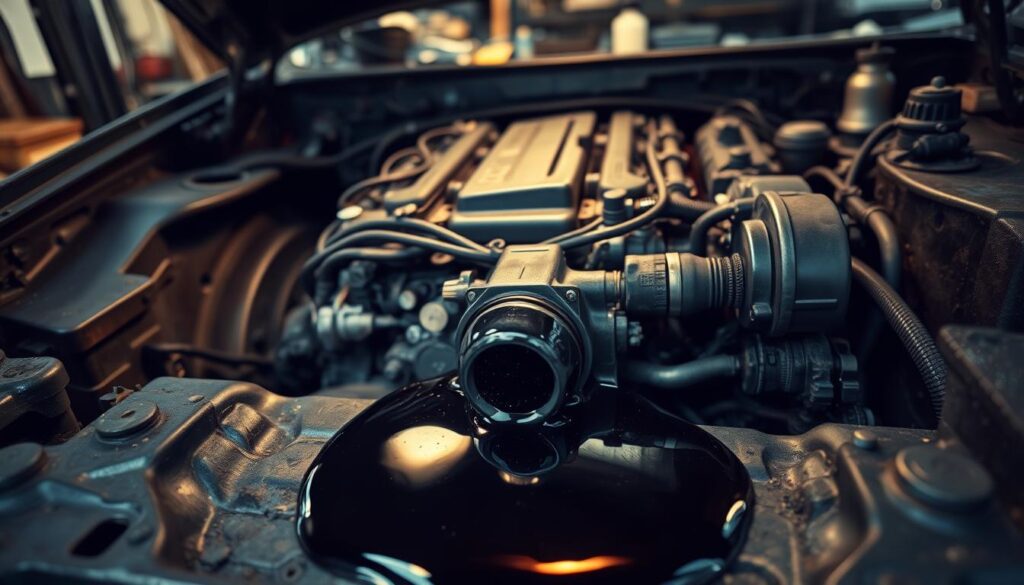
Oil leaks after an oil change are not just a hassle. They can also point to bigger problems. Knowing why they happen is key for car owners to fix them right.
Loose or Cross-Threaded Drain Plug
A loose or cross-threaded drain plug often causes oil leaks. If the plug isn’t tightened right or gets damaged, leaks can happen. Make sure to tighten it to the right torque.
Improperly Installed Oil Filter
An oil filter put in wrong can also leak oil. If it’s not fitted right or is too tight, it can get damaged and leak. Always follow the maker’s guide for installing oil filters.
Damaged Gaskets and Seals
Damaged gaskets and seals can also leak oil. If these parts get hurt or not checked during an oil change, leaks can occur. It’s important to check and replace them when needed.
Overfilled Oil Reservoir
Too much oil in the reservoir can build up pressure and leak. Always check the oil level after changing it and make sure it’s just right.
Poor Quality Replacement Parts
Using low-quality parts, like oil filters or gaskets, raises the risk of leaks. High-quality parts from trusted makers can help avoid these problems.
By knowing these common causes, car owners can stop oil leaks after an oil change. This keeps their car running well.
Why Is My Car Leaking Oil After an Oil Change? Diagnosing the Source
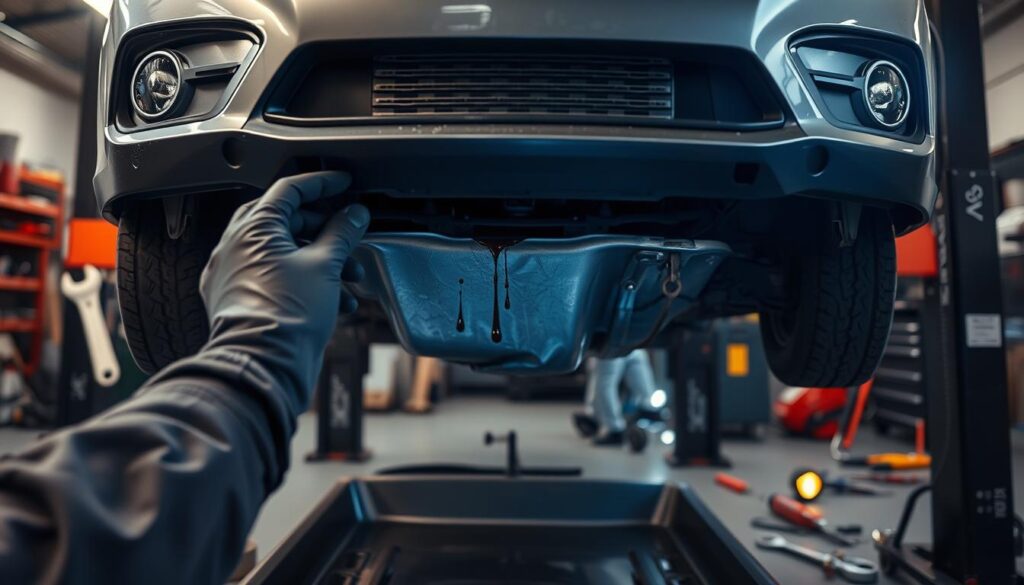
To find out why your car is leaking oil after an oil change, you need to figure out where the leak is. You can do this by using visual checks and knowing where leaks usually happen.
Visual Inspection Techniques
Start by looking for leaks around the oil change area. Check the oil level and see if there are any drips. Also, check the ground under your car for oil spills.
Common Leak Locations to Check
Here are some places to look for oil leaks:
- Under the Oil Filter: Make sure the oil filter is tight and not damaged.
Under the Oil Filter
- Check if the oil filter is well-attached and look for any leaks or damage.
- Around the Drain Plug: Make sure the drain plug is tightened right.
Around the Drain Plug
- Look for leaks or damage on the drain plug. It should be tightened correctly.
- Oil Pan Gasket Area: Check for oil leaks around the oil pan gasket.
Oil Pan Gasket Area
- Inspect the oil pan gasket for damage or leaks. This area often leaks if not sealed well.
Using Cardboard to Track Leaks
Use cardboard to find the oil leak source. Place cardboard under your car overnight. The oil drip on the cardboard will show you where the leak is.
By following these steps, you can find the oil leak source after an oil change. It might be a loose oil filter, a damaged gasket, or something else. Finding the problem is the first step to fixing it.
DIY Solutions for Post-Oil Change Leaks
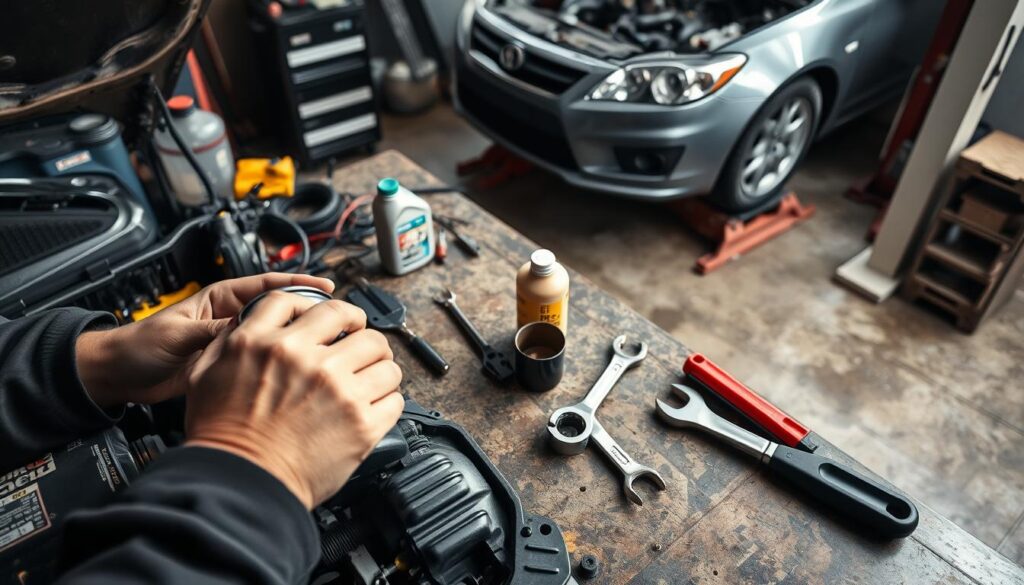
If your car leaks oil after an oil change, don’t worry. You can fix it yourself with a few simple steps. Oil leaks can be annoying, but catching and fixing them early can prevent bigger problems.
Safely Tightening the Drain Plug
A loose drain plug is a common cause of oil leaks. First, make sure the engine is cool. Then, find the drain plug and tighten it in a star pattern. This avoids damaging the oil pan. But, don’t overdo it, as that can harm the oil pan too.
Properly Reseating the Oil Filter
Oil leaks can also come from a loose oil filter. Check if the filter is tight and the gasket is okay. If not, remove it, inspect the gasket, and put it back. Make sure it’s hand-tight plus a bit more. Use a filter wrench if needed, but don’t overdo it.
Replacing Damaged Gaskets
Worn-out gaskets and seals can also leak oil. Look for any damage on these parts. Replacing them needs some mechanical skills, but it’s doable. Make sure to get the right parts for your car.
Correcting Oil Levels
Too much oil can also leak. Check the oil level with the dipstick. If it’s too high, drain some oil until it’s just right. Always check your car’s manual for the right oil amount.
Cleaning Up Oil Spills Safely
Clean up oil spills quickly to avoid damage. Use materials like cat litter or sawdust to soak up the spill. Then, throw away the material properly. For big spills, use a commercial oil spill cleaner.
By trying these DIY fixes, you might solve oil leaks after an oil change on your own. But, if the leak doesn’t stop or you’re not sure what’s wrong, it’s wise to get help from a mechanic.
When to Seek Professional Help
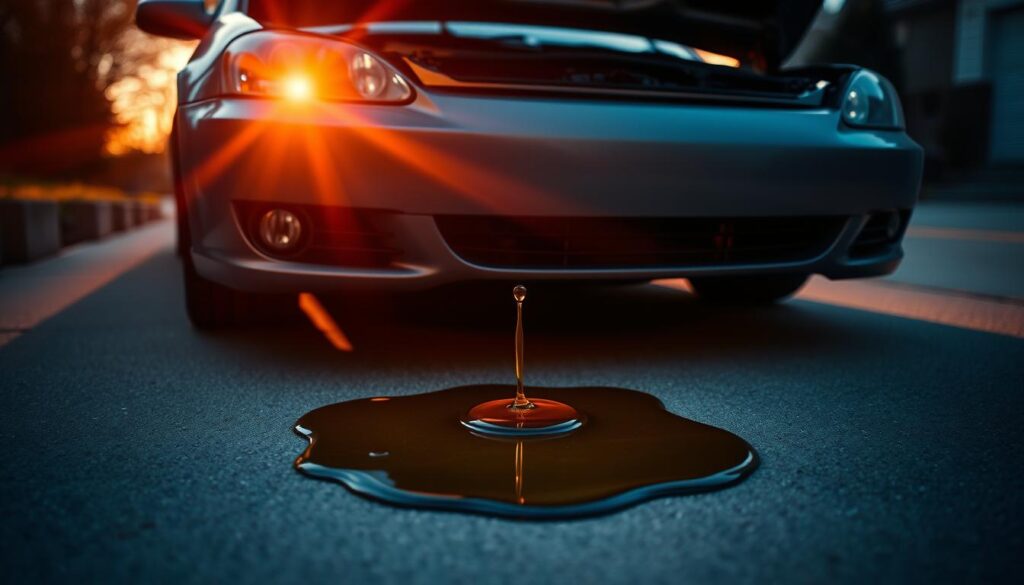
Oil leaks that don’t stop can mean a big problem. While you can fix small leaks yourself, some issues need a pro. This is to avoid harming your car more.
Signs of Serious Engine Problems
Look out for these signs: unusual noises from the engine, significant oil loss, or warning lights on your dashboard. These could mean serious engine trouble that needs quick action.
Warranty and Liability Considerations
If your car is under warranty, fixing it yourself might break the warranty. Always check your warranty terms and know your risks if repairs go wrong.
Estimated Repair Costs
Fixing an oil leak can cost a lot, depending on the problem and the mechanic’s rates. You might spend $100 to $500 for parts and labor. But, if it’s a tough fix, the price could go up a lot.
And if you have a car from a top brand like Mazda, BMW, Audi or Genesis, the price could be even higher.
Finding a Qualified Mechanic
To find a good mechanic, ask people you trust, read online reviews, and look for ASE certifications. A skilled mechanic will find the problem and give you a fair repair quote.
Plus if you like to read more on car repair, then you must check out our recent blogs on car scratch repair and hail damage repair.
FAQs
Is it normal for cars to leak oil after an oil change?
No, it’s not normal. Leaks might indicate a mistake during the oil change.
Why is my car leaking oil when parked after service?
It could be due to improper sealing or a loose filter.
Why would a car suddenly leak oil?
It could be a damaged gasket, worn seals, or a loose oil plug.
Is it normal to lose oil between oil changes?
No, it’s not normal. Losing oil might indicate an underlying issue.
Conclusion
Fixing oil leaks quickly is key to keeping your car in top shape. Regular car care, like checking for oil leaks and fixing them fast, stops bigger engine issues. Knowing why oil leaks happen after an oil change helps you keep your car running well.
Good car care is more than just oil changes. It’s about taking care of your car in every way. Watching for oil leaks and getting help when you need it keeps your car running longer and saves you money. Regular checks and upkeep spot problems early, before they get worse.
By using the tips from this article, you can find and fix oil leaks. This keeps your car in great shape. Whether you do it yourself or get a mechanic’s help, taking care of your car is vital for its performance and life.
And another common problem is car smoking but not overheating, so we have written a detailed blog to solve that problem, you can check it out too if you want.

I am Tushar Balchandani, founder of Car Info Expert and someone who has been working extensively in the car industry as a car expert for 15 years. My aim is to provide useful truthful and reliable information to the readers based on my real experiences and hands-on experience. From buying tips to maintenance guides, I help readers make confident car-related decisions.


